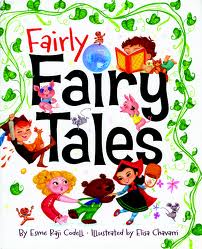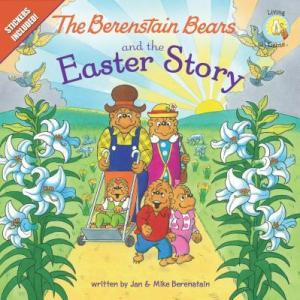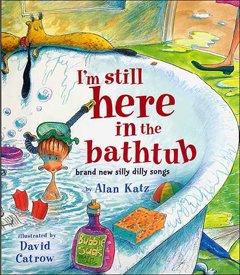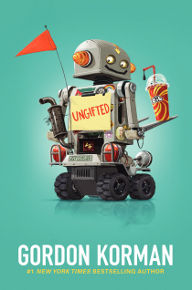
What
would a techo-modern version of the Three Little Pigs look like? Little
Red Riding Hood? Cinderella? Solar panels, discos, and salons meet
fairy tales when a child and mom read together at bedtime.
There are scores of children’s books, both picture and chapter, that revamp traditional fairy tales. What makes
Fairly Fairy Tales different? The illustrations by Chavarri put the traditional story in a modern setting with technology.
Parents and children love to play “question” games: Would you eat
spaghetti made with gummy worms? Would you wear your clothes backwards
all day? Sometimes the answer is “yes” and sometimes it’s “no”–but the
fun is in the asking. Gifted writer and educator Esme Raji Codell has
writtten a book that incorporates fractured fairy tales with this kind
of parent-child interplay to create a pitch-perfect combination of
bedtime read-aloud and fairytales that will delight children and
parents! The pictures by Elisa Chavarri are bright and cartoony.
Booklist said:
Kids current on their fairy tales will appreciate the
whimsical way Codell spins the basics by adding one oddball element to
each story told by a mother to her recalcitrant boy at bedtime. In the
tale of the Three Little Pigs, for instance, solar panels make an
appearance along with the straw and bricks. After the boy checks off the
tried-and-true elements of Little Red Riding Hood, red hood, wolf, and
grandma, he has to pause to consider if shampoo can figure into the
plot: NOOOOO! Well, maybe. Chavarri’s colorful, almost wordless two-page
spreads imagine how the twists impact each story and are packed with
details delighted readers will pore over. At Grandma’s Beauty Salon, for
instance, several wolves, one wearing a Big ‘N’ Bad T-shirt, are
getting their fur pampered. Baskets of goodies are for sale, and Grandma
is painting the heroine’s nails with Lil’ Red polish. This fun outing
will be a surefire winner whenever it’s read bedtime or not.
Codell’s text is simple, but actually very smart. She presents three
elements that readers who are familiar with fairy tales will recognize,
then throws in a fourth element that does not traditionally belong with
the fairy tale at all. On the page this is show as pictures on a white
background with the words above them.
This collection of mixed-up fairy tales begins with a mother reading
to a child at bedtime. “Kiss? Yes./Water? Yes./Bedtime? NOOOO!” The
retro illustrations, reminiscent of the 60′s carry the story forward.
They artfully create zany and fun juxtapositions. For example, in the
story of the Three Little Pigs, sticks, straw and bricks are followed
by, “Solar panels? NOOOOO!” and the next page concedes, “Well, maybe,”
as readers are treated to a double-page spread depicting hippie pigs
hanging solar panels on their brick townhouse. They work next to a
community garden where a folk music concert is taking place. Sharp-eyed
readers will spot the first of many visual jokes, including a wolf
strolling by, handing out flyers promoting wind power.
By adding shampoo to Little Red Riding Hood’s story, the grandmother
becomes a manicurist at a beauty salon. Red gets her nails done as the
woodsman expertly shampoos the wolf’s mane. An abundance of the little
details filled with sly humor make this book really fun to read. The
salon contains baskets of sale items, including “Den Head” fur wax, and a
copy of “WQ” magazine (Wolf’s Quarterly, no doubt) for waiting patrons
to read. A disco ball hangs from the ceiling and readers find
Cinderella shimmying in a silver jumpsuit and platform heels. She dances
with a suspiciously John-Travolta-esque Prince Charming. Meanwhile, a
bellbottomed Fairy Godmother looks on and giggles.
The recurring refrain of, “Well, maybe,” finally comes in to play at
the end of the book as the mother and child say, “Kiss? Yes./Water?
Yes./Bedtime? Well, maybe,” leaving the child snuggled soundly into bed.
Fairly Fairy Tales is a nice, fun addition to the pile, great for sharing one-on-one.
 In The Berenstain Bears and the Easter Story (Berenstain Bears/Living Lights), the
Bear cubs and Papa are candy-crazy this Easter! But Mama, with help
from Papa, tells the cubs about Jesus’ resurrection and shows them that
salvation is much sweeter than candy. The book includes a colorful
sticker set.
In The Berenstain Bears and the Easter Story (Berenstain Bears/Living Lights), the
Bear cubs and Papa are candy-crazy this Easter! But Mama, with help
from Papa, tells the cubs about Jesus’ resurrection and shows them that
salvation is much sweeter than candy. The book includes a colorful
sticker set.

